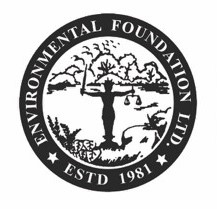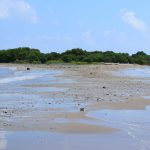Despite global recognition for their biodiversity, Sri Lanka’s moist tropical evergreen forests seem to be less valued by its citizens, as development goals and population pressures have steadily eroded forest cover, often leaving only isolated patches which still sustain rare and endemic species. Buoyed by green credibility and a conducive policy framework that was afforded to renewable energy, mini hydro power projects have mushroomed in the South-west, harnessing water sources that are often found in pristine and untouched rainforests. While the
The proliferation of lucrative yet often ill-planned and destructive mini hydro power plants in the wet zone region has been a serious environmental and social concern, as these projects can destroy endemically rich and biodiverse habitats in fragmented forest patches, while causing problems with the water supply for neighbouring settlements. EFL investigated many cases of destructive mini hydropower plants, including a project on the Koskulana River, bordering Sinharaja Forest Reserve which eventually led to litigation against the project developers. In
EFL conducted a visit to a mini hydro project in Kitulgala on the 7th July. A weir currently being constructed has resulted in the river bank being extensively cleared leading to a landslide blocking the river. In addition to felling of trees, rocks have been blasted and the debris has been dumped in the river. The mini hydro project belongs to the Divisional Secretariat of Yatiyanthota and lies in the village of Mahabage on the north bank of Girangkiththa oya
EFL held a successful awareness session for financial institutions on the detrimental environmental, social and financial consequences of investing in mini hydro projects in ecologically sensitive areas. The awareness session was held on the 10th of June 2016 at the Sri Lanka Foundation Institute in collaboration with Sri Lanka Water Partnership and was attended by representatives of major banks including National Development Bank, Sampath Bank, National Savings Bank, and Peoples Bank as well as representatives from the Central Environmental Authority.
EFL conducted a site visit to Erathne in the Ratnapura District, which lies between the Samanala Strict Forest Reserve (which is connected to the central highlands UNESCO World Heritage Site) and Eratna Girimale Protected Forest Reserve. The Kuru Ganga originates from the Samanala Reserve, flowing through the Girimale Reserve to eventually join the Kalu Ganga. Three mini hydro power plants with a capacity ranging from 10-2 MW are currently situated on the Kuru Ganga, while another mini hydro plant is
Environmental Foundation Limited in collaboration with Sri Lanka Water Partnership (SLWP) recently held “A Dialogue on Policy Implications and Community Concerns Resulting from the Approval Process of Mini Hydro Power Plants” on the 31st of March at the International Water Management Institute (IWMI). The dialogue was held with the objective of gathering all stakeholders to address various concerns arising due to mini hydropower projects and identify the shortcomings in the approval process. The event consisted of two panel discussions, a community panel
EFL conducted a site visit to Koskulana on the 14th of December 2015 to investigate the environmental impacts posed by a mini hydro power plant constructed on the banks of the Koskulana River, located in the buffer zone of the Sinharaja Forest. In addition to the extensive environmental damage caused by the construction of the weir and powerhouse, EFL was able to confirm discrepancies between the Initial Environmental Examination (IEE) and the implementation of the project. Download the full report here.
Environmental concerns have come to the forefront of global issues in recent years and the world has begun to move towards more sustainable methods of meeting the energy requirements of the growing population. As an island nation rich in natural resources Sri Lanka has the potential to engage in the generation of power through solar, wind and hydro energy. With the encouragement of the relevant government authorities’ Sri Lanka has seen a rise in the contribution of sustainable energy





